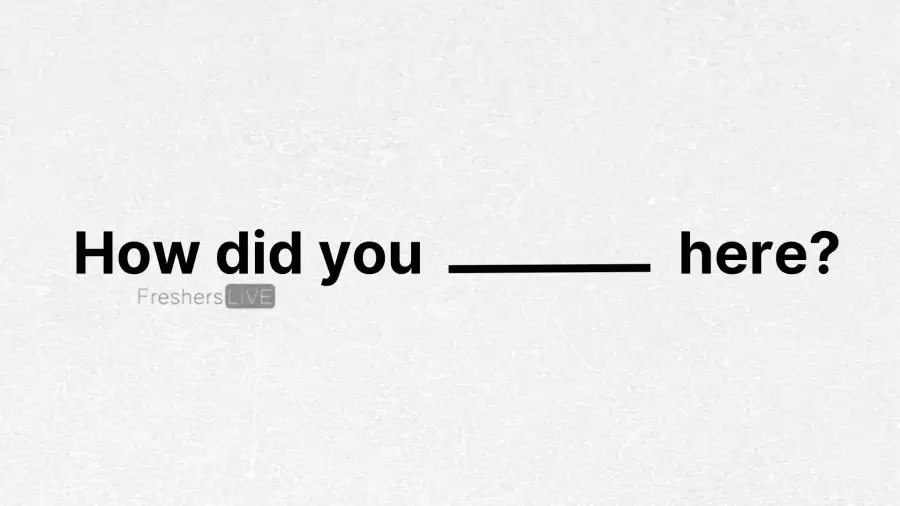Solve The Grammar Challenge with Five Questions in this Puzzle
by T Santhosh
Updated Oct 09, 2023

Solve The Grammar Challenge with Five Questions in this Puzzle
Discover the world of grammar puzzles. These puzzles make you think about grammar and use your creative thinking skills. They keep your mind active and might help you feel less stressed. There are many different grammar challenges to enjoy, including the ones we'll talk about next. This challenge can be a bit tricky and is best for people who are really good at grammar and pay attention to small details. When you become great at solving this kind of puzzle, it's not just for fun – it gives you skills that can be useful in many parts of your life.
Even though the puzzle might seem hard at first, your goal is to find a solution that follows the grammar rules perfectly and reveals the puzzle's secrets. In the next section, we'll explain this grammar puzzle in detail and show you how to solve it.
Whether you're looking for a quick Brain Teaser to solve during your lunch break or a more in-depth challenge to work on over the weekend, Fresherslive has puzzles for everyone.
1. How did you ____ here?
The sentence "How did you come here?" is constructed to inquire about the method or means by which someone arrived at their current location. It uses the adverb "how" to ask about the manner or way in which the action occurred. The auxiliary verb "did" is employed to form questions in the past simple tense, and "you" serves as the subject, referring to the person being asked. The main verb "come" indicates the action of arriving or moving to a specific location, and "here" specifies the destination or place of arrival.

2. ____ your teeth sensitive?
The question "Are your teeth sensitive?" is asking about how your teeth are right now. It uses "are" because it's talking about more than one tooth that belongs to you. "Your" shows that the teeth being talked about are yours. "Teeth" is the word for those things in your mouth, and "sensitive" describes how they feel. So, this question is checking if your teeth are feeling sensitive at the moment.

3. ____ you do it?
The sentence "Will you do it?" uses the word "will" to form a question about future actions or intentions. It's a way of asking someone if they plan to do something later on. In this question, "will" indicates the future tense, "you" refers to the person being asked, "do" represents the action or task in question, and "it" stands for whatever that action or task is. So, when we put it all together, this question is simply asking if the person intends to carry out a specific action or task in the future.

4. They ____ cakes
The phrase "have baked" in the sentence "They have baked cakes" is used to tell us that, in the past, the people (they) did the action of baking cakes, and now the cakes are done and ready. It's a way of talking about something that happened before now, and it connects that past action to the present moment. So, the cakes were made in the past, and now they exist as a result of that past action.

5. I ____ you
The phrase "will call" in the sentence "I will call you" is used to let the person know that the speaker (I) intends to make a phone call to them in the future. It's like saying, "I plan to get in touch with you later." The word "will" is important because it tells us that this action, calling, is going to happen at some point beyond the present moment. So, in simple terms, this sentence means that the speaker has a plan to contact the person by phone at a later time.

Calculate the Result of 288 ÷ 12 + 5 x 3 - 63 ÷ 7=?
To solve this calculation, use the order of operations. Begin with the divisions and multiplications from left to right: 288 ÷ 12 equals 24, and 63 ÷ 7 equals 9. The equation becomes 24 + 5 x 3 - 9. Now, carry out the multiplications and additions/subtractions from left to right: 5 x 3 equals 15, and 24 + 15 equals 39. Therefore, the solution is 39.
Find the Value of 336 ÷ 14 + 6 x 4 - 56 ÷ 8=?
For this problem, apply the order of operations. Start with the divisions and multiplications from left to right: 336 ÷ 14 equals 24, and 56 ÷ 8 equals 7. The equation becomes 24 + 6 x 4 - 7. Next, perform the multiplications and additions/subtractions from left to right: 6 x 4 equals 24, and 24 + 24 equals 48. Thus, the answer is 48.
Solve The Grammar Challenge with Five Questions in this Puzzle FAQs
Grammar puzzles are challenges that test your understanding of grammar rules through word or sentence manipulation.







